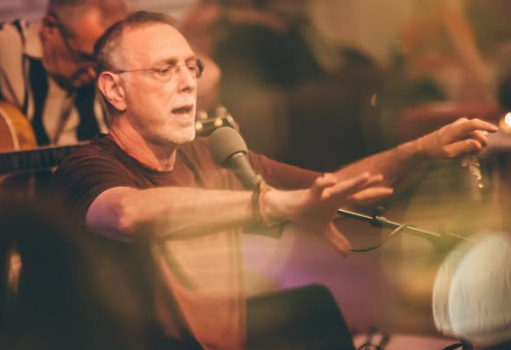
Podcast: Play in new window | Download
Subscribe: Apple Podcasts | Spotify | Amazon Music | Email | RSS
Call and Response Ep. 61 Do What You Like, Taking It Personally, As Time Goes By
Q: I go to kirtans. I put in music in my car and I chant and I’ve developed a little bit of a practice. I have a daily sadhana, ultimately because of you… But I’m wondering what it looks like… besides going to kirtan or in my car, (what) do you recommend as part of… a daily sadhana of sitting, like in a meditation pose, and chanting and with music on in the background, that I’m chanting to? Or memorizing various… lines? I’ve memorized a few.
“Do what you like. Find out what it is that you like. You’re the only one who knows. Somebody can give you suggestions. Somebody can order you to do things. Somebody can tell you to do things. Somebody can say, “Don’t do this, don’t do that.” Fine. If that feels right to you. See, that’s what’s happening anyway. Even if somebody tells you something, you’re agreeing to either do it or not do it, for whatever reason. It might be you like to be punished, so you can do what you don’t like. I tried that for about 50 years. So, really, in all seriousness, the whole thing is to trust yourself.” – Krishna Das
Q: First, thank you for your music and being you and I’ve told you before, but I guess your music and you really changed my life, ultimately.
KD: Mine, too.
Q: And so, I do have a question. The practicality that, the actual on-the-ground practicality of chanting, I hear from others, just chant, chant the names. Well, I go to kirtans. I put in music in my car and I chant and I’ve developed a little bit of a practice. I have a daily sadhana ultimately because of you and my yoga. But I’m wondering what it looks like besides going to kirtan or in my car. And I chant and I’ve developed a little bit of a practice. But I’m wondering what it looks like, besides going to kirtan or in my car, do you recommend as part of like, a daily sadhana of sitting, like in a meditation pose, and chanting and with music on in the background, that I’m chanting to? Or memorizing various, you know, lines? I’ve memorized a few.
KD: I’m going to give you the secret teaching here. You ready? Do what you like. You have to find out what you like, what works for you, what you want to do, and do it. Don’t do what you don’t like. See how that feels. You might not do what you don’t like and feel bad. So, then you’d better do something. It’s up to you. What does it matter what I say? If I say something, then you’ll do it, maybe, and say “Ah, he’s full of shit, it didn’t work. I’m not going to do that. Good. Do what you like. Find out what it is that you like. You’re the only one who knows. Somebody can give you suggestions. Somebody can order you to do things. Somebody can tell you to do things. Somebody can say, “Don’t do this, don’t do that.” Fine. If that feels right to you. See, that’s what’s happening anyway. Even if somebody tells you something, you’re agreeing to either do it or not do it, for whatever reason. It might be you like to be punished, so you can do what you don’t like. I tried that for about 50 years. So, really, in all seriousness, the whole thing is to trust yourself. Learn how to find what works for you. Now, of course, there are many traditional, many lineages and many teachings already available that have worked for somebody, maybe many “somebody’s”, that doesn’t mean it’s going to work for you right now. It doesn’t mean it’s right for you right now. Only you know. Who else would know?
Q: Thank you.
_____________
Q: Hello, Krishna Das.
KD: Where are you? Hi.
Q: I met you before Jivamukti out in the desert out in California and I’d seen you moping. I saw you. I get it.
KD: Sometimes I mope just to make people look at me. They feel sorry for me, you know, and then they give me stuff and they’re nice to me.
Q: It was all you. It was real and I get it. And we’re both from Long Island and we’ve got the same schtick.
KD: Well, that explains it.
Q: You know, I, you inspire me. I want to thank you.
KD: To mope?
Q: No, no, no, no. I’ve got something to share.
KD: Ok.
Q: The moping is actually the essence of my question or my thought is that we are love. I get it. The practice is…
KD: Do you really?
Q: Yeah, I do.
KD: Do you really?
Q: I really do.
KD: When you really get it, you are it. There’s nobody to talk about out it.
Q: No, I get it.
KD: You understand it might be true.
Q: I believe it. You know, it’s in my cells. I know it.
KD: Good.
Q: But I also know that most of us come into this room programmed through our conditioning, through our genetic makeup, whatever it is, with this intense negativity and my wonder is, the amazement that I have is that we don’t all come in here just chanting the Name of God with happiness, without anything else, just naturally. Rather than having to find it because we’re under a rock. Which you did. I did. We did. All of us. Most of us come that way. What’s that all about? Why is it that we don’t wake up and come into this room Pure Love rather than the dark side? That’s my question.
KD: You know, one time I was in the temple and I was sitting with Siddhi Ma, Maharajji’s great devotee and one of, the oldest grandchild of my Indian parents, the Tiwari’s, was getting married and he and the other cousins, they all came to the temple for blessings. And so we were all sitting in the back there and I was watching these kids, right? They’re one family. And there was so much love and so much happiness among these cousins, this, and I was just sitting there and I couldn’t believe how sweet they were, you know? And then, Siddhi Ma looked at me and She said, “You see, Krishna Das? You see? This is what you missed by being born in America.” And I went, “Right.” So, I said, “Ma, what is it with us? With Westerners? Why can’t we love? Why can’t we let ourselves be loved?” She said a few things, but the main thing she said was that affection was used to control you as a child and so, right then, love went out the window because we learned that if we wanted to get what we needed, which was everything, from our parents who are our whole universe when you’re a baby, we had to show them some affection. We couldn’t by crying and nasty all the time because we wouldn’t, they would get angry at us and upset. That’s simplifying it. But essentially, it’s that we sensed that when we were, when the affection shined on us and when it didn’t, and that was used to control us from all the way through and so immediately we learned we have to do business in order to get what we want and that program is still running at 150,000 miles an hour. And also, that’s the way this world is. You know, we have our individual experience, but it’s not completely, it’s not an isolated experience. We’re, there’s a group experience of being on the Earth at this time. Of being here at this time or being, who’s in your life, how you grew up, what kind of, what you were taught, what you absorbed, what the people around you believed. And on one hand, you know, I feel that, we learn to feel about ourselves the way our parents felt about themselves. Not necessarily how they felt about us, but how they saw themselves, we absorb that way of seeing our self. And hey, I know my parents. I’m surprised I can even sit up straight. Not that they meant to do any harm. They were also programmed by their parents who were programmed by their parents and their culture. And then there’s more. You know? I mean, scientifically, they’ve now proven that trauma is passed on in the, around the DNA there’s like a sheath and they’ve proven that trauma is passed on through the generations through that covering of the DNA. So, while we may have trauma that’s caused specifically in this life, we’re also carrying this shadow of it from our parents and the trauma they experience. World Wars. A-bombs. You know, a lot of stuff happened to people. And we’re sharing that trauma as well.
So, it’s a lot of stuff to process and let go of as we try to enter that inner love that lives within us. And it’s not all our fault. It’s nobody’s fault. It’s the way the world is now. It’s the way that people are programmed in this, on this earth at this time for the most part. That’s why they say it’s a great blessing to be born into a family of yogis because you don’t, you don’t get programmed the same way. So, it’s not… we take it all so personally, “This is my pain. This is my unhappiness. This is my bullshit. This is that. This is that.” But it’s not only “mine.” We’re sharing a huge ocean of suffering. Some of us have our toes in it. Some of us are up to here. Some of us are up to here. So, that’s all programmed by karma. How much? And what we have to do? The idea, though, that anything can be dealt with is humongous. We don’t give ourselves credit for that. We don’t give our self credit for coming to a place like this to do some practice, to learn some stuff. And we don’t realize what a big thing that is. Like I said yesterday, “People get born, they graduate High School, they drink some beer and they watch tv and then they die. And they’re never here for a moment.” At least, because of grace and our good karmas, at least we’re trying to get a vote. We’re trying to get here. At least we understand that it might be possible. That’s a huge thing. Now, let’s move on from this place and do the best we can. All you can do is the best you can. You can’t do better than the best you can. And no matter how bad you think you’re doing, you’re doing the best you can. So, keep doing it.
I talk much better with coffee.
Sai Baba taught me how to do that.
____________
KD: hi.
Q: Hi. So, every about 3 of 4 years or so, I have the great blessing to be sitting here before you, with you doing your stuff, sharing with you in your stuff and it’s one of the great benchmarks that I’ve come to have in terms of reflecting what’s going on in my life, where I am now as to where I was then and it’s kind of cool to look at that and about 10 years ago, you were kind enough to pose in a photo with me. This was before Apples and selfies and all of that, and I have to say, you and I, we looked really different in that photo 10 years ago.
KD: I was three feet tall?
Q: So, for me, you know, coming, I’ve been thinking a lot because I, you know, physically, in body, in maturation, in a very different place, a very marked place in my life right now, and I wanted to ask you, you know, how do you feel as you return to certain places, to be with us and how things, whether you, or the venue where you’re sharing space, you know, how you mark those changes and sort of rectify who you are now versus at another place and time in your life?
KD: Could you simplify that a little bit?
Q: Ok, sure. So, so things that you use to mark the time, what is it like for you, say, you know, to come back here now as opposed to five or ten years ago and how do you rectify change in transition? That make sense?
KD: Maybe.
Q: Ok.
KD: The implication is that I might know the answer to that question. I really don’t, one of the nice things about getting old is that you don’t think as much about yourself. I don’t really spend a lot of time trying to analyze where I’m at. And as a result, I feel a lot better. So, maybe, because when we tend to evaluate ourselves, we always kind of lean towards the negative side. “What am I doing wrong?” Or, “I’m still stuck in this. I can’t let go of that. Blah blah blah.” All that stuff. So, little by little, one’s state, one’s own state of mind becomes less important. It becomes, you know, basically, for most of us, we go through our day as if we are the number one most important thing in the universe. Everything revolves around our sense of self or happiness. “Are we feeling ok now? Are we feeling ok now? No. We’ve got to do this. We’ve got to do that. That person looks like they’re feeling better than I’m feeling. That’s not good. I should feel better. This is not good.” You know? This kind of stuff. I don’t really.. I think I have a little less of that going on, maybe. Is that ok?
Q: Well, yeah. Thank you.
KD: You’re welcome. Very welcome. But maybe I don’t. Maybe I just don’t care. But, and that’s the same thing, too. You don’t necessarily care about how you’re feeling all the time. It’s, it becomes more irrelevant. You know, you don’t, from here, after this is over, I’ll walk back to my cabin, my place. Am I going to be thinking, “Wow, I don’t know. Did I answer the questions ok? Maybe I did? Maybe I didn’t? Maybe I should have said this? Maybe I should have said that?” That doesn’t happen so much. But for most of us, and for me it happens a lot, but I think it’s happening a little less, if I had to think about it. Which you’re asking me to do.
Thank you.
All right.
As you do these practices, especially with the repetition of the Name, not especially, but that’s mostly what I do, you find that the Name comes back to you by itself during the day. While you’re walking around, while you’re doing stuff, you’ll notice, “Oh, there it is.” So, stay with it for a minute until you forget and that will happen more often. You’ll be pulled back into yourself more often as the day goes on. Even without a conscious effort at that moment to so-called, remember. It’ll happen because you’re training, you’re familiarizing yourself with the feeling of being freer some of the time. More of the time. So, that feeling, because it’s naturally, you understand? That feeling is natural. That’s what’s in there. When we know ourselves, we are free. We are not bound by our thoughts, our emotions, by time and space. We are love. Endless eternal love. That’s who we are. So, that love is pulling us all the time to come back home. And that’s what happens during the day as you go through your day, especially if you’re training yourself to turn towards that place in moments of practice. In other moments, too. Practice doesn’t mean this. It can me, you know, you’re walking around, all of a sudden you come back from dreamland and you’re here for a second and then you’re gone again. That’s a practice. That planted a seed of coming back right there, right then.




I am 51, and was a first time voyager last night. You started by journey. I am forever changed and eternally grateful. .
♡♡♡